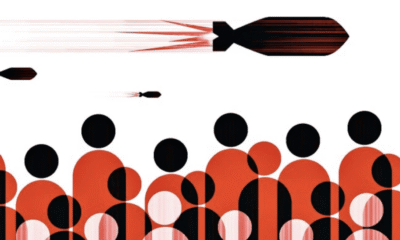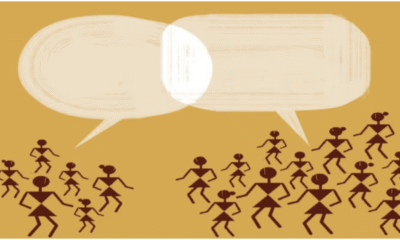
|
Getting your Trinity Audio player ready...
|
(The article was originally published in Indian Express on December 09, 2023 as a part of Dr Madhav’s column titled ‘Ram Rajya’. Views expressed are personal.)
It is strange that the Congress leadership is raising so much heat over Home Minister Amit Shah’s statement in Parliament about Nehru’s blunders in Kashmir — the ceasefire decision and taking the matter to the UN Security Council. This is not the first time that the Home Minister has said so. During the debate in Parliament on the abrogation of Article 370 in August 2019, he called Nehru’s decision to go to the UN the “biggest mistake” and a “Himalayan blunder”. Shah had asked: “What was the need to announce a ceasefire when we were about to win the war?”
Moreover, these are verified historical facts. Hence, the Congress’ indignation sounds less righteous and more pretentious. Interestingly, the Congress leadership, which used to proudly own up and support the so-called “special status” under Article 370 in the past, is now making defensive claims that all decisions relating to Kashmir were taken collectively, and hence, Nehru cannot be blamed for them.
Some overzealous Congress leaders are suggesting that the ceasefire decision was that of the then Commander-in-Chief General Francis Robert Roy Bucher, and Nehru simply followed his advice. In a couple of letters purportedly written to Nehru, the General had suggested that in view of the “tiredness and ennui” in the ranks, the army needs “respite for leave, training and vitalising”. He also advised Nehru to resort to a “political approach to this problem”.
Willy-nilly, the Congress leadership is acknowledging that Nehru was dancing to the tunes of the British masters even on such crucial matters rather than depending on his own judgement or that of his Indian colleagues. Worse is to make the military the scapegoats for the blunders that the political leadership had committed. It’s a fact that Nehru became a useful tool for the British during those years. For example, when Sardar Patel took a strong stand against transferring Rs 550 million to Pakistan, asserting that money could not be given to it “for making bullets to be shot at us”, Mountbatten used Nehru to reach out to Gandhi asking him to prevail upon Patel.
Even Gandhi was opposed to taking the Kashmir issue to the UN. When he heard about the talk, he clearly stated on December 27, 1947, that “I shall advise Pakistan and India to sit together and decide the matter. If the two are interested in the settlement of the dispute, where is the need for an arbitrator?”.
On his part, Sardar used to ridicule the Security Council as “Insecurity Council”.
The Congress’ pretensions notwithstanding, the entire Kashmir mess should unreservedly be put at Nehru’s doorstep. It was he who insisted on granting a special status to Kashmir during the Constitution making, and, later on, created a monster through the Delhi Agreement of 1952 with his dear friend Sheikh Abdullah.
Contrary to the Congress’ claims now, Nehru always handled the Kashmir issue as a personal matter and never took the sane advice of his colleagues positively. Ambedkar was the first to reject the special status idea, bluntly telling Sheikh Abdullah that “making limited application of laws made by Parliament for the state of Jammu and Kashmir would create lots of problems rather than solving.”
Nehru then decided to entrust the responsibility of drafting the special law to his trusted colleague, and a former prime minister of Maharaja Hari Singh, N Gopalaswami Ayyangar.
Nehru’s decision led to a controversy when Sardar Patel, who was handling the accession of over 535 princely states, objected to the singling out of Kashmir. Nehru responded to Patel’s annoyance rather curtly: “Gopalaswami Ayyangar has been especially asked to help in Kashmir matters. I really do not know where the States Ministry (Patel’s ministry) comes into the picture,” he wrote to Patel on December 27, 1947, underscoring that all this was happening at his instance and “I do not propose to abdicate my functions in regard to matters for which I consider myself responsible”.
Ayyangar found dealing with Sheikh Abdullah difficult. When Sheikh Abdullah started objecting to the draft article, an annoyed Ayyangar threatened to resign, saying, “Our discussion this morning, as I indicated to you, left me even more distressed than I have been since I received your last letter from Srinagar.”
Interestingly, when Ayyangar placed the draft article 306A (later to become Article 370) before the Congress Working Committee (CWC) in October 1949, it was rejected by nearly everyone except two — Ayyangar himself and Maulana Abul Kalam Azad.
Nehru was abroad. He reached out to Patel, seeking his intervention in convincing the CWC. Patel faced a dilemma. But not willing to allow any bitterness to creep in between him and Nehru at the very dawn of Independence, he decided to reconvene the CWC. When members objected, Patel convinced them to honour it since it involved Prime Minister Nehru’s personal prestige as he had already given his word to Sheikh Abdullah. When Nehru returned, Patel wrote to him: “After a great deal of discussion, I could persuade the (Congress) party to accept.”
Patel didn’t live long enough to see the Article’s ill effects. But in his absence, Nehru lied to the Parliament in 1952 saying: “Sardar Patel was all the time dealing with these matters.” Even Ayyangar was taken aback. V Shankar, Sardar Patel’s biographer, quotes Ayyangar as bemoaning, “It is an ill-return to the Sardar for the magnanimity he had shown in accepting Panditji’s point of view against his better judgement”.
When the draft finally reached the Constituent Assembly, it faced stiff opposition from many members there as well. Hasrat Mohani, a renowned Urdu poet and a member of the Communist Party asked Ayyangar, “Why this discrimination, please?”. He demanded that similar concessions be given to the ruler of Baroda, too. Finally, the Article was placed in the Constitution under “Temporary, Transitional and Special Provisions”.
This is the truth about Nehru’s blunders, a bit bitter and harsh, but absolutely true.




